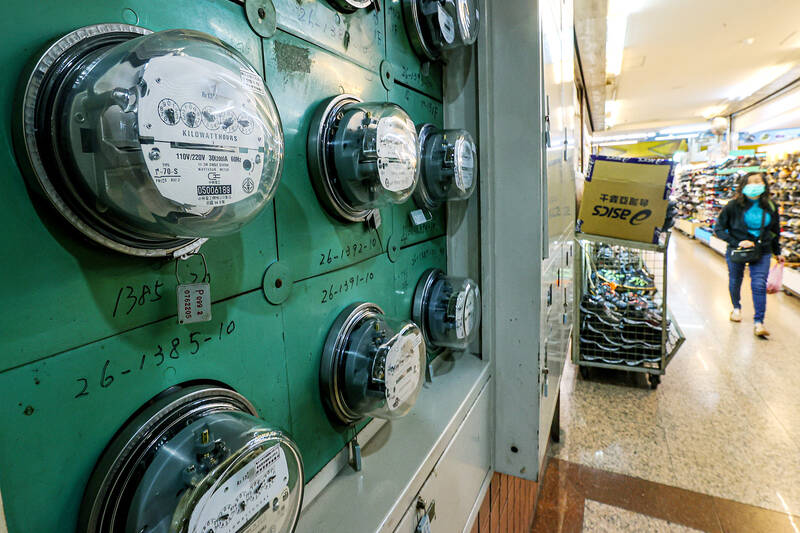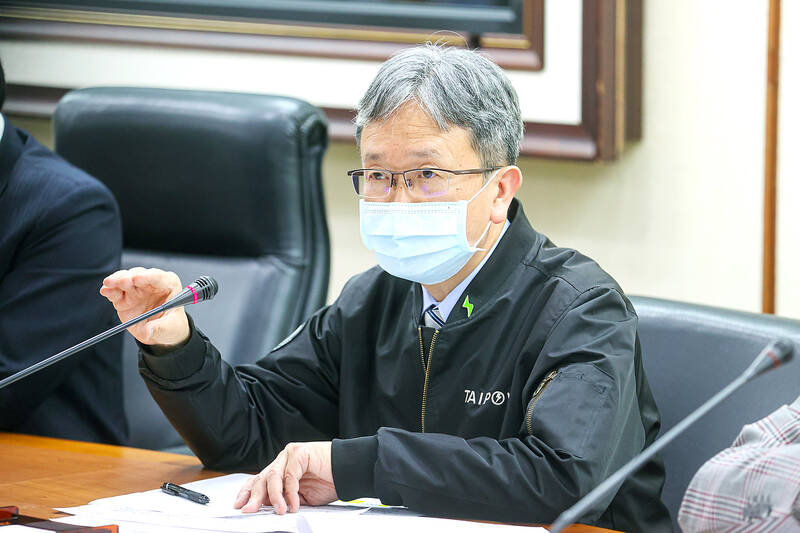The Ministry of Economic Affairs yesterday raised electricity rates by an average of 11 percent on heavy users, while rates for most household and schools are to stay unchanged.
The rate increases would be halved for some heavy users in sectors affected by a downturn in the economy, the ministry added.
Industrial and service sector organizations expressed regret about the rate increases, saying they would drive up costs amid an economic slowdown.

Photo: CNA
The rate increases came after policymakers sought to keep state-run Taiwan Power Co (Taipower, 台電) afloat, without sapping efforts to tame inflation or exacerbating the financial burden on the public.
“The electricity review committee decided to raise electricity rates as international fuel costs remain high,” the ministry said in a statement.
For every kilowatt hour (kWh) of electricity Taipower sold last year, it incurred a loss of NT$1.2, the ministry said, adding that the utility’s debt remained high despite government support.

Photo: CNA
The committee said that rates would rise 17 percent for high-voltage and ultra-high-voltage electricity users, which are mainly manufacturers of tech and non-tech products.
Rates for low-voltage electricity users, mainly businesses focused on domestic demand, would be raised 10 percent, it said.
The rate adjustment would not affect households that consume less than 700kWh of electricity per month and businesses that use less than 1,500kWh, it said.
This comprises 90 percent of households and 80 percent of businesses, it said.
Schools and companies in the agricultural and fisheries sectors would also not be affected, the ministry added.
Policymakers said the adjustment aims to encourage energy conservation and takes into account the needs of disadvantaged groups.
The rate increases would be halved for companies whose power consumption fell 10 percent year-on-year in the second half of last year, when global inflation and monetary tightening started to weigh on exports, the ministry said.
Electricity rates would rise 3 percent for households that use 701kWh to 1,000kWh of electricity per month and stores that consume 1,501kWh to 3,000kWh, it said.
Households that use more than 1,000kWh of power per month would face 10 percent higher rates and commercial facilities that use more than 3,000kWh would face a 5 percent increase, it said.
The Taipei-based Chinese National Federation of Industries (全國工業總會) called the rate increases regrettable.
“The 17 percent hike for heavy industrial users is steeper than last year’s 15 percent increase,” the federation said, adding that the higher rates would affect “companies that struggle with inventory corrections and business slowdown.”
The rate increases should be halved for more companies facing economic hardship, it added.
The Third Wednesday Club (三三會), a trade group whose membership is limited to the top 100 firms in individual sectors, voiced concern that the rate increases would weaken local companies’ global competitiveness and affect planned investments in Taiwan.
The Taipei-based Chinese National Association of Industry and Commerce (工商協進會) said the government should not raise electricity rates, as it would render its efforts to curb inflation futile.

DEFENDING DEMOCRACY: Taiwan shares the same values as those that fought in WWII, and nations must unite to halt the expansion of a new authoritarian bloc, Lai said The government yesterday held a commemoration ceremony for Victory in Europe (V-E) Day, joining the rest of the world for the first time to mark the anniversary of the end of World War II in Europe. Taiwan honoring V-E Day signifies “our growing connections with the international community,” President William Lai (賴清德) said at a reception in Taipei on the 80th anniversary of V-E Day. One of the major lessons of World War II is that “authoritarianism and aggression lead only to slaughter, tragedy and greater inequality,” Lai said. Even more importantly, the war also taught people that “those who cherish peace cannot

STEADFAST FRIEND: The bills encourage increased Taiwan-US engagement and address China’s distortion of UN Resolution 2758 to isolate Taiwan internationally The Presidential Office yesterday thanked the US House of Representatives for unanimously passing two Taiwan-related bills highlighting its solid support for Taiwan’s democracy and global participation, and for deepening bilateral relations. One of the bills, the Taiwan Assurance Implementation Act, requires the US Department of State to periodically review its guidelines for engagement with Taiwan, and report to the US Congress on the guidelines and plans to lift self-imposed limitations on US-Taiwan engagement. The other bill is the Taiwan International Solidarity Act, which clarifies that UN Resolution 2758 does not address the issue of the representation of Taiwan or its people in

Taiwanese Olympic badminton men’s doubles gold medalist Wang Chi-lin (王齊麟) and his new partner, Chiu Hsiang-chieh (邱相榤), clinched the men’s doubles title at the Yonex Taipei Open yesterday, becoming the second Taiwanese team to win a title in the tournament. Ranked 19th in the world, the Taiwanese duo defeated Kang Min-hyuk and Ki Dong-ju of South Korea 21-18, 21-15 in a pulsating 43-minute final to clinch their first doubles title after teaming up last year. Wang, the men’s doubles gold medalist at the 2020 and 2024 Olympics, partnered with Chiu in August last year after the retirement of his teammate Lee Yang

The Philippines yesterday criticized a “high-risk” maneuver by a Chinese vessel near the disputed Scarborough Shoal (Huangyan Island, 黃岩島) in a rare incident involving warships from the two navies. The Scarborough Shoal — a triangular chain of reefs and rocks in the contested South China Sea — has been a flash point between the countries since China seized it from the Philippines in 2012. Taiwan also claims the shoal. Monday’s encounter took place approximately 11.8 nautical miles (22km) southeast” of the Scarborough Shoal, the Philippine military said, during ongoing US-Philippine military exercises that Beijing has criticized as destabilizing. “The Chinese frigate BN 554 was